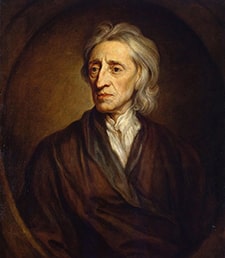John Locke (1632 – 1704) was the most influential philosopher in Europe in the late seventeenth century. He is best known for his work on human rights and free speech. He was a thinker and writer who helped to create the European Enlightenment and the U.S. Constitution. In politics, many of the ideas that he advocated were later accepted in England after the Glorious Revolution of 1688-89 and in the United States after the country’s declaration of independence in 1776.
Locke’s family were sympathetic to Puritanism, but they still attended services at the Church of England. This influenced Locke’s later thoughts and beliefs. Locke was born in Pensford, England, in the late 1630s. The English Civil War began in 1642, and Locke was only 10 years old at the time. The war lasted for many years, and by the end of it, Oliver Cromwell had become the leader of the parliamentary forces. Locke’s father was a lawyer who fought in the cavalry of the Parliamentarians. He saw some action during his time with them.
After the Civil War ended in 1646, Locke’s father was able to get Locke a place at Westminster School in London. Locke went to the same place as famous people before him. The school had been taken over by the new republican government, but the headmaster, Richard Busby, was a royalist. Locke was under Busby’s instruction and control for four years. Busby was a strong disciplinarian who favored the birch. In January 1649, Charles was beheaded on the orders of Cromwell. This happened right next to Westminster School, which is where Charles had been educated. The boys were not allowed to attend the execution, but they were likely very aware of what was happening nearby. The Westminster School curriculum focused on learning Latin, Greek, Hebrew, Arabic, mathematics, and geography.
In 1650, Locke was elected a King’s Scholar, an academic honor that allowed him to buy several books. These books included classics in Greek and Latin. Locke was a good student, but he didn’t enjoy school. In his enormously influential work Some Thoughts Concerning Education (1693), he wrote about how boarding schools were too focused on corporal punishment and the bad behavior of students.
In 1652, Locke was 20 years old and had just started at Christ Church University. At this point, the University of Oxford was in the middle of the Civil War, and because of this, Locke had to deal with a lot of danger and stress. Oxford had been a place where the royals and their supporters used to live, but now it was a place where Puritans lived. Chancellor Cromwell and chaplain John Owen were both responsible for overseeing the university. Owen and Cromwell were concerned with restoring the university to its former state as soon as possible. They largely succeeded in doing this. Locke found the undergraduate curriculum at Oxford to be less exciting and stimulating than he was hoping for. Yet he graduated from college in 1656 and got a master’s degree in two years later. He was elected a student (equivalent to fellow) of Christ Church during this time. Oxford Locke met people who were advocates of the new science, including Bishop John Wilkins, the astronomer and architect Christopher Wren, the physicians Thomas Willis and Richard Lower, the physicist Robert Hooke, and the eminent natural philosopher and theologian Robert Boyle. Locke was interested in chemistry and medicine, and he worked with Boyle on some important medical research.
In his first political work “Two Tracts on Government,” Locke presented his rather conservative ideologies. This was a different way of thinking than what John Locke would later advocate in his “Two Treatises of Government.”
In 1663, Locke was appointed senior censor at Christ Church, a position that required him to oversee the studies and discipline of undergraduate students and give lectures. The resulting Essays on the Law of Nature (first published in 1954) constitutes an early statement of his philosophical views, many of which he retained more or less unchanged for the rest of his life.
By 1668, Locke had become a member of the Royal Society and was working with his friend Thomas Sydenham, the most distinguished physician of the period. Together, they were conducting medical research, Locke helped to write The Fundamental Constitutions for the Government of Carolina, which guaranteed freedom of religion for all except atheists. He started working on his popular work “An Essay Concerning Human Understanding (1689)” in the same year.
Locke stayed in France for a long time, spending a lot of time in Paris and Montpelier, and also travelled around many destinations during political unrest and his exile. These places have a lot of different religions, which is one of the reasons Locke liked them. His political beliefs were majorly dependent on his religious ideals and Locke studied several religions while crafting his philosophies.
Locke didn’t return home until after the Glorious Revolution. In 1688, Locke accompanied Mary II back to England. Locke published a lot of books in quick succession after he escaped from exile. Although his time spent in England was often difficult because of his asthma, he nevertheless became an important political figure on the Whig side. During this time, he talked to some very important people, such as John Dryden and Isaac Newton. Locke died on October 28, 1704, and is buried in the churchyard of the village of High Laver.


